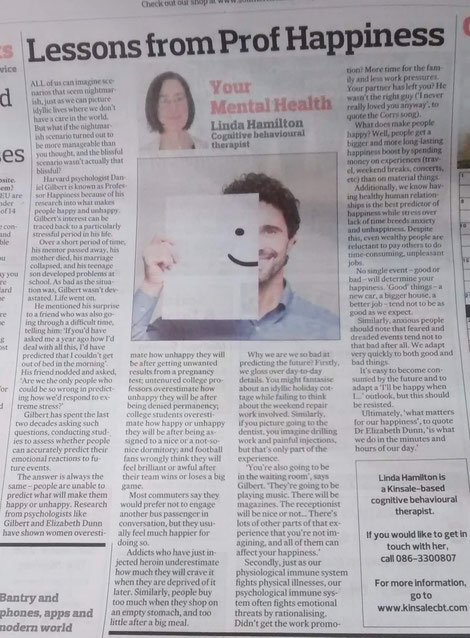
Last week's 'Your Mental Health' column in the Southern Star looked at what people can learn from happiness research, particularly the findings of 'Professor Happiness', psychologist Daniel Gilbert. The column is reproduced below.
All of us can imagine scenarios that seem nightmarish, just as we can picture idyllic lives where we don’t have a care in the world. But what if the nightmarish scenario turned out to be more manageable than you thought, and the blissful scenario wasn’t actually that blissful?
Harvard psychologist Daniel Gilbert is known as Professor Happiness because of his research into what makes people happy and unhappy. Gilbert’s interest can be traced back to a particularly stressful period in his life. Over a short period of time, his mentor passed away, his mother died, his marriage collapsed, and his teenage son developed problems at school. As bad as the situation was, Gilbert wasn’t devastated. Life went on. He mentioned his surprise to a friend who was also going through a difficult time, telling him: ‘If you’d have asked me a year ago how I’d deal with all this, I’d have predicted that I couldn’t get out of bed in the morning’. His friend nodded and asked, ‘Are we the only people who could be so wrong in predicting how we’d respond to extreme stress?’
Gilbert has spent the last two decades asking such questions, conducting studies to assess whether people can accurately predict their emotional reactions to future events. The answer is always the same – people are unable to predict what will make them happy or unhappy (continued below...)
HAPPINESS PREDICTIONS
Research from psychologists like Gilbert and Elizabeth Dunn have shown women overestimate how unhappy they will be after getting unwanted results from a pregnancy test; untenured college professors overestimate how unhappy they will be after being denied permanency; college students overestimate how happy or unhappy they will be after being assigned to a nice or a not-so-nice dormitory; and football fans wrongly think they will feel brilliant or awful after their team wins or loses a big game. Most commuters say they would prefer not to engage another bus passenger in conversation, but they usually feel much happier for doing so. Addicts who have just injected heroin underestimate how much they will crave it when they are deprived of it later. Similarly, people buy too much when they shop on an empty stomach, and too little after a big meal.
Why we are we so bad at predicting the future? Firstly, we gloss over day-to-day details. You might fantasise about an idyllic holiday cottage while failing to think about the weekend repair work involved. Similarly, if you picture going to the dentist, you imagine drilling work and painful injections, but that’s only part of the experience. ‘You're also going to be in the waiting room’, says Gilbert. ‘They're going to be playing music. There will be magazines. The receptionist will be nice or not… There's lots of other parts of that experience that you're not imagining, and all of them can affect your happiness.’
Secondly, just as our physiological immune system fights physical illnesses, our psychological immune system often fights emotional threats by rationalising. Didn’t get the work promotion? More time for the family and less work pressures. Your partner has left you? He wasn’t the right guy (‘I never really loved you anyway’, to quote the Corrs song).
What does make people happy? Well, people get a bigger and more long-lasting happiness boost by spending money on experiences (travel, weekend breaks, concerts, etc) than on material things. Additionally, we know having healthy human relationships is the best predictor of happiness while stress over lack of time breeds anxiety and unhappiness. Despite this, even wealthy people are reluctant to pay others to do time-consuming, unpleasant jobs.
No single event – good or bad – will determine your happiness. “Good” things – a new car, a bigger house, a better job – tend not to be as good as we expect. Similarly, anxious people should note that feared and dreaded events tend not to be that bad after all. We adapt very quickly to both good and bad things.
It’s easy to become consumed by the future and to adapt a “I’ll be happy when I...” outlook, but this should be resisted. Ultimately, “what matters for our happiness”, to quote Dr Elizabeth Dunn, “is what we do in the minutes and hours of our day”.